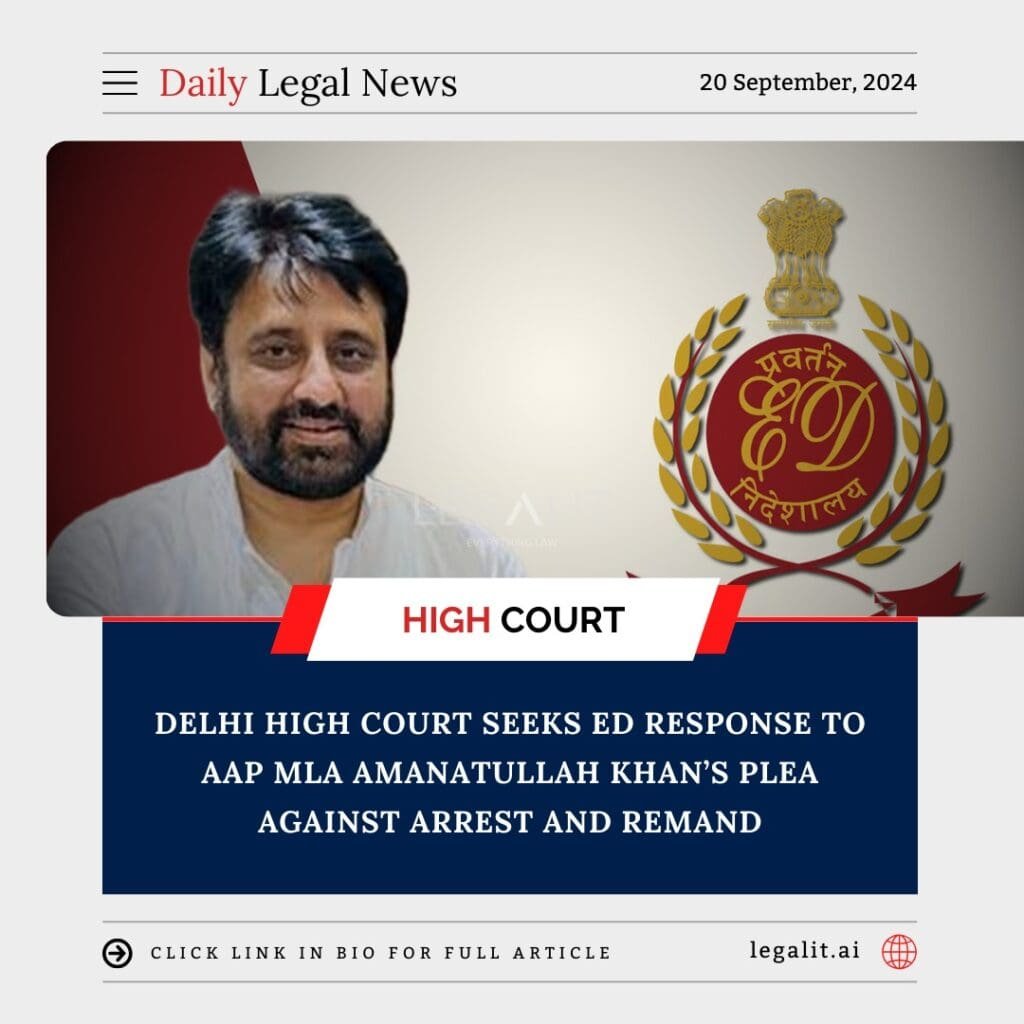
In a recent development, the Delhi High Court has sought a response from the Enforcement Directorate (ED) in connection with a petition filed by Amanatullah Khan, an AAP MLA. Khan challenged his arrest and subsequent remand by the ED, claiming that his detention was unjustified and illegal. The court’s directive signals a deeper examination of the circumstances surrounding Khan’s arrest as the ED continues its investigation into alleged financial irregularities.
Background of the Case
Amanatullah Khan, a prominent member of the Aam Aadmi Party (AAP), was arrested by the ED in relation to a case of alleged money laundering and financial mismanagement. The investigation stems from earlier cases registered by the Anti-Corruption Bureau (ACB) and other agencies, where Khan was accused of misappropriation of government funds, irregularities in the functioning of the Delhi Waqf Board, and other financial crimes.
The Enforcement Directorate, which handles cases under the Prevention of Money Laundering Act (PMLA), arrested Khan on the grounds of alleged involvement in laundering the proceeds from these irregularities. Following his arrest, Khan was remanded to ED custody for further investigation.
Khan’s Petition: Key Arguments
Amanatullah Khan, in his petition to the Delhi High Court, has challenged the legality of his arrest and subsequent remand. The primary arguments put forward by his legal team include:
- Illegal Arrest: Khan’s counsel has argued that the ED’s arrest was carried out without proper adherence to the legal process. They claim that there was no prima facie evidence or substantial material that warranted his arrest under the stringent provisions of the PMLA. According to his defense, Khan’s detention was politically motivated.
- Violation of Rights: The petition also claims that Khan’s fundamental rights were violated, particularly the right to liberty and protection from arbitrary detention. His legal team has accused the ED of acting beyond its jurisdiction and infringing upon Khan’s rights during the investigation.
- Unjustified Remand: Khan’s counsel argued that the remand granted by the lower court was unjustified, as there was no urgent need for custodial interrogation. They contended that the remand was granted based on weak evidence and procedural lapses on the part of the ED.
- Political Targeting: Khan has also claimed that his arrest is a result of political vendetta, given his position as an influential MLA of the Aam Aadmi Party in Delhi. His defense has stated that his arrest is an attempt to malign his reputation and weaken his political standing ahead of crucial elections.
Court’s Direction
The Delhi High Court, after hearing the initial submissions from Khan’s legal team, has sought a detailed response from the Enforcement Directorate. The court has directed the ED to present its justification for Khan’s arrest and remand, along with the evidence that forms the basis of their investigation.
The court’s directive suggests that the legality of Khan’s arrest and the procedures followed by the ED will be closely scrutinized. The High Court is expected to examine whether the provisions of the PMLA were correctly applied and whether Khan’s rights were upheld during the investigation.
Enforcement Directorate’s Stand
The Enforcement Directorate has maintained that Khan’s arrest was based on substantial evidence of financial misconduct. The ED claims that their investigation revealed that Khan was involved in laundering money linked to irregularities in the management of the Delhi Waqf Board and other financial schemes. According to the ED, custodial interrogation is necessary to uncover the full extent of Khan’s alleged involvement in these crimes.
The agency is expected to submit a detailed reply to the High Court, outlining the evidence and the need for Khan’s remand to further investigate the flow of illicit funds. The ED’s response will likely include the details of transactions and financial documents that led to Khan’s arrest.
Implications of the Case
The Delhi High Court’s decision on Khan’s plea could have significant implications for both the political and legal landscape:
- Precedent for Political Arrests: The case could set a precedent for how courts deal with arrests of political figures, particularly those facing charges of corruption or financial irregularities. A favorable ruling for Khan might prompt closer judicial scrutiny of arrests made by investigating agencies like the ED in politically sensitive cases.
- Implications for the AAP: Khan’s case is closely followed due to his position within the Aam Aadmi Party. The outcome could have repercussions for the party, particularly as it positions itself for upcoming elections in Delhi and other states. A ruling against Khan could dent the party’s image, while a favorable decision might bolster their narrative of political targeting by central agencies.
- Enforcement of PMLA: The case could also clarify the extent to which the PMLA can be invoked in cases involving political figures. Given the stringent nature of the PMLA, the High Court’s ruling may influence how investigating agencies apply the law in future cases.
Conclusion
The Delhi High Court’s decision to seek the ED’s response to Amanatullah Khan’s plea marks a critical phase in the legal battle over his arrest and remand. As the court evaluates the legality of the arrest, the case will continue to draw attention due to its potential impact on both legal processes under the PMLA and the broader political context in which it unfolds.